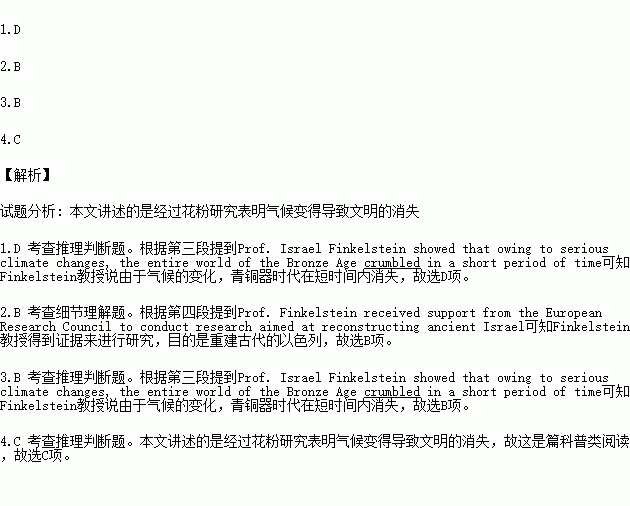题目内容
A new pollen (花粉) study showed that drought was responsible for the extinction of civilizations more than 3,000 years ago during the Bronze Age.
The reason behind why the civilizations in and around modern-day Israel suddenly broke down more than 3,000 years ago has remained a mystery up until now. A new pollen study by Tel Aviv University researchers finally solved this Bronze Age mystery.
Prof. Israel Finkelstein showed that owing to serious climate changes, the entire world of the Bronze Age crumbled in a short period of time. The discovery was made on the basis of a high-resolution analysis of pollen grains taken from sediments (沉淀物) beneath the Sea of Galilee and the western shore of the Dead Sea.
Prof. Finkelstein received support from the European Research Council to conduct research aimed at reconstructing ancient Israel. Researchers of the part of the project that dealt with climate change extracted (提取) about 60 feet of samples of gray muddy sediment from the center of the Sea of Galilee in northern Israel. They had to drill through 1,000 feet of water and into 65 feet of the lake bed and were able to recover evidence dating over the past 9,000 years.
“Pollen is the most enduring organic material in nature,” explained Dr. Dafna Langgut, a pollen researcher who carried out the actual work of sampling. “These grains tell us about the plants that grew near the lake in the past and therefore prove the climatic conditions in the region.”
Researchers noted a sharp decrease in Mediterranean trees like oaks and pines in the Late Bronze Age. According to study experts, this could be because of repeated periods of drought. The droughts may have resulted in long famines, forcing people to migrate from north to south.
1.The underlined word “crumbled” in Paragraph 3 means _____.
A. settled B. changed
C. established D. disappeared
2.Prof. Finkelstein conducted the new pollen study to _____.
A. earn some money
B. recreate ancient Israel
C. learn more about local plants
D. discover the ancient civilizations
3.By conducting the study, scientists found _____.
A. Mediterranean trees were rare in the Early Bronze Age
B. climate change was to blame for the lost civilization
C. people in the Late Bronze Age starved to death
D. droughts were rare during the Bronze Age
4.The text is most probably taken from _____.
A. a travel magazine B. a history textbook
C. a newspaper report D. an agricultural book
 期末宝典单元检测分类复习卷系列答案
期末宝典单元检测分类复习卷系列答案选出方框中恰当的词语,并用其适当的形式填空。
make a decision , be crowded with, choose from, be strict with, make progress, be decorated with, contribute …to…, be covered with, depend on, separate… from |
1.Sometimes it is hard to . You should think it over before taking action.
2.Usually the first bus passengers who are hurrying to work.
3.There are all kinds of gifts to in the shop.
4.His parents him and don’t allow him to play outside late at night.
5.With the teacher’s help, the boy is .
6.On every Spring Festival, our house all kinds of lights and flowers.
7.Each one of us some money that disabled child yesterday.
8.The land and the houses snow, so we seem to live in a fairy tale world.
9.It all whether she likes the boss or not.
10.Can you help me the red beans peanuts?


